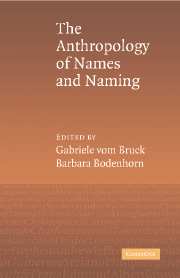Book contents
- Frontmatter
- Contents
- Contributors
- Preface and Acknowledgments
- 1 “Entangled in Histories”: An Introduction to the Anthropology of Names and Naming
- 2 “Your Child Deserves a Name”: Possessive Individualism and the Politics of Memory in Pregnancy Loss
- 3 Why the Dead Do Not Bear Names: The Orokaiva Name System
- 4 The Substance of Northwest Amazonian Names
- 5 Teknonymy and the Evocation of the “Social” Among the Zafimaniry of Madagascar
- 6 What's in a Name? Name Bestowal and the Identity of Spirits in Mayotte and Northwest Madagascar
- 7 Calling into Being: Naming and Speaking Names on Alaska's North Slope
- 8 On Being Named and Not Named: Authority, Persons, and Their Names in Mongolia
- 9 Injurious Names: Naming, Disavowal, and Recuperation in Contexts of Slavery and Emancipation
- 10 Where Names Fall Short: Names as Performances in Contemporary Urban South Africa
- 11 Names as Bodily Signs
- Bibliography
- Index
3 - Why the Dead Do Not Bear Names: The Orokaiva Name System
Published online by Cambridge University Press: 17 August 2009
- Frontmatter
- Contents
- Contributors
- Preface and Acknowledgments
- 1 “Entangled in Histories”: An Introduction to the Anthropology of Names and Naming
- 2 “Your Child Deserves a Name”: Possessive Individualism and the Politics of Memory in Pregnancy Loss
- 3 Why the Dead Do Not Bear Names: The Orokaiva Name System
- 4 The Substance of Northwest Amazonian Names
- 5 Teknonymy and the Evocation of the “Social” Among the Zafimaniry of Madagascar
- 6 What's in a Name? Name Bestowal and the Identity of Spirits in Mayotte and Northwest Madagascar
- 7 Calling into Being: Naming and Speaking Names on Alaska's North Slope
- 8 On Being Named and Not Named: Authority, Persons, and Their Names in Mongolia
- 9 Injurious Names: Naming, Disavowal, and Recuperation in Contexts of Slavery and Emancipation
- 10 Where Names Fall Short: Names as Performances in Contemporary Urban South Africa
- 11 Names as Bodily Signs
- Bibliography
- Index
Summary
In what follows, I attempt to show that among the Orokaiva of Papua New Guinea, the use of a name system constitutes the morphological framework that maps the relations between people and groups through time. This, of course, does not mean that this system is intangible, but on the contrary, that while it is repeatedly reshaped by other dimensions of Orokaiva social life, like historical events, wars, individual endeavors and so forth, its capacity to preserve its general structure render these momentary movements meaningful. The point is thus that the system of names, far from being a rigid framework, is instrumental both in prolonging society through time and in granting meaning to all events.
This Orokaiva fact projects, I believe, a comparative light on an old debate concerning the status of kinship and marriage and that of the title system. The name system is here instrumental in projecting society through time, just as kinship, marriage, and title system may be in other places.
The major contemporary discovery in Melanesia is undoubtedly that persons are not closed up units but that relations constitute them. This conception implies that all sorts of things, like objects of exchange, are integral to the person. In this context, one might expect names to be one of the most intimate assets of the individual. Among the Orokaiva, this is, however, not the case.
- Type
- Chapter
- Information
- An Anthropology of Names and Naming , pp. 51 - 72Publisher: Cambridge University PressPrint publication year: 2006

